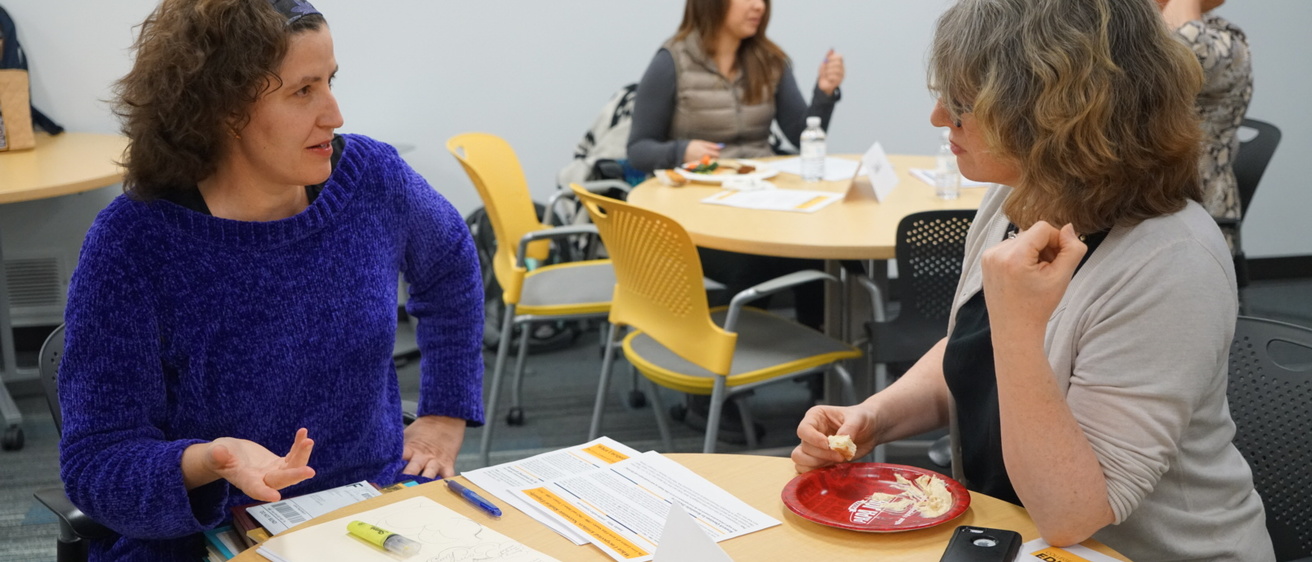By Elianna Novitch
The Graduate Student Research Colloquium highlights the work of Teaching and Learning graduate and professional students
Topics ranging from bilingual education to how English Language Arts’ teachers engage students in racial discourse were explored when graduate students of the Department of Teaching and Learning presented their research at this year’s Graduate Student Research Colloquium Friday, Jan. 24.
The event was planned and organized by the Graduate Student Planning group in the Department of Teaching and Learning in the UI College of Education. Members include Kelli Rushek, Alejandro Perez, Ercin Sahin, Lanqi Wang, and EunJung Kim.
“I hope we can consolidate a tradition that started two years ago, and that still has a lot of potential,” Alejandro Perez says. “This year we have continued the work done last year, which offered keynote speakers, poster sessions, and roundtable discussions.”
The purpose of the research colloquium is to highlight the work of Teaching and Learning graduate and professional students and give them an opportunity to present their research to an audience. The research colloquium gives students an opportunity to receive feedback and questions that will help further guide their research as they move forward as well as help graduate students develop leadership skills.
There are currently 66 doctoral students enrolled in the Department of Teaching and learning. Twenty of them participated in the colloquium.
“I valued hearing from other graduate students and faculty members who are working on the field of literacy, culture, and language,” Perez says. Perez co-presented a poster alongside fellow graduate student Angela Pico on the need to develop literacy resources for bilingual contexts where Latinx voices need to be represented.
Graduate students who presented as this year’s Graduate Student Research Colloquium include:
- Alejandro Perez, doctoral student in Foreign Language & ESL Education, and Angela Pico, Developing Resources for Spanish-English Bilingual Education: A New Literacy
- Maria Slusarek, doctoral student Foreign Language and ESL Education, and GoMee Park, doctoral student in Foreign Language and ESL Education, Advocacy, Capacity and Collaboration for English Learners (ACCEL) in Iowa
- Andrea Malek, doctoral student in Science Education, and Professor Brian Hand, Elementary Teachers’ Epistemic Orientation to Learning and Knowledge-Generating Environments
- Chenchen Ding, doctoral student in Science Education, Development of a Questionnaire on Teachers’ Knowledge of Language as an Epistemic Tool
- Lanqi Wang, doctoral student in Special Education, Using Feedback to Teach Academic Skills to Students with Disabilities: A Single-Case Design Meta-Analysis
- Ercin Sahin, doctoral student in Science Education, Describing Students' Reasoning in an Immersive Argument-based Science Inquiry
- Ali Cikmaz, doctoral student in Science Education, Examining Growth and Interdependence of Epistemic Tools in Different Learning Environments
- Geoff Hughes, doctoral student in Language, Literacy and Culture, The influence of Americanization on Community Colleges in the Midwest
- Diane Neubauer, doctoral student in Foreign Language and ESL Education, Language Play as a Resource for Beginning Chinese Language Learning
- Jamie Tanas, doctoral student in Science Education, Analysis of alignment messages to the Next Generation Science Standards across contextual levels
- Kate Lechtenberg, doctoral student in Language, Literacy and Culture, What's Critical? What's Next? Critical Conversations and Teacher Identity Work in Secondary Classrooms
- Kelli Rushek, doctoral student in Language, Literacy and Culture, What’s next for critical cosmopolitanism? Preparing a presentation
- Tasha Lindo, doctoral student in Language, Literacy and Culture, Tracing the Beginnings of Prior Knowledge and its Pedagogical Influences: Considering Reader Response Theory and Experiences in the Classroom
- Jenn Miller, doctoral student in Language, Literacy and Culture, Using Critical Archival Theory and Radical Empathy When Encountering Unexpected Artifacts: The Love Letters of Carrie Ellen Stanley (1886 - 1962) and James J. Trickey (1888 - 1913)
- Alyssa Guzman, Master of Arts in Teaching (MAT) student in English Education, Student language and identity
- Tamar Bernfeld, doctoral student in Language, Literacy and Culture, It’s Not What You Say, Es Como Lo Dices: The Multifunctional Uses of Spanish on the Democratic Debate Stage
- Katie Priske, doctoral student in Language, Literacy and Culture and English Education certification, The Future of Feminism: Responding to Feminist Texts
